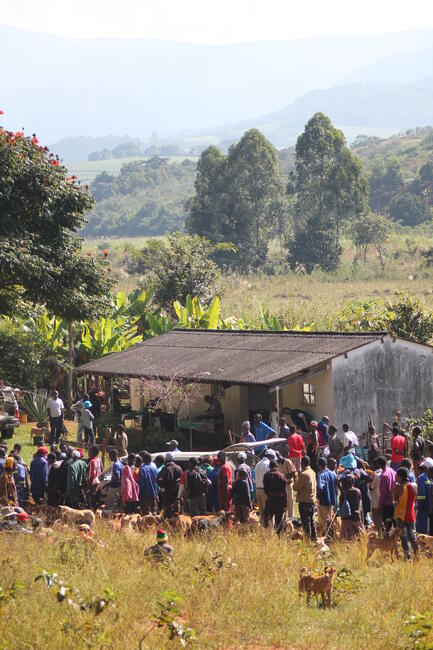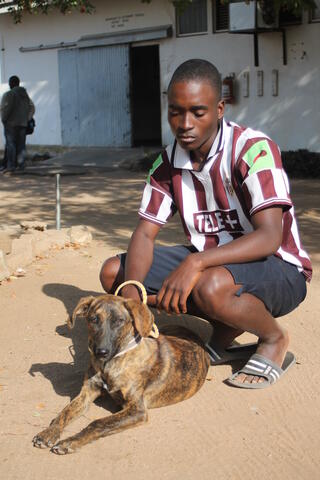Zimbabwe animal welfare agency vaccinated over 6,000 dogs in 2017
- Community News
- Dog vaccination
Veterinarians for Animal Welfare Zimbabwe (VAWZ), an NGO registered as a private voluntary organisation of animal welfare inspectors, has been in operation since April 2010. Their staff works countrywide, dealing with animal welfare issues in domestic animals, livestock, and wildlife. Melanie Hood, the lead animal welfare officer, is in charge of the day-to-day running of VAWZ, as well as general operating procedures. Inspectors Edmore Takaopwa, Bernard Ndlovu and Livison Chareka are active on the ground, assessing the standards of animal welfare across the country. In addition, Dr. Isaac Moyo and Mr. Lovemore Ncube run the Victoria Falls Animal Health and Welfare Centre.
Through education and training, VAWS creates a greater awareness of animal welfare issues, as well as investigating possible cruelty cases. In addition, VAWZ has a number of special projects. Amongst these are our rural rabies vaccination and sterilization campaigns.
In Zimbabwe, the dog population is estimated to be around 700,000, and the majority of these animals live in the vast, rural areas, where their owners have little or no access to veterinary treatment for their animals. In addition, funding constraints within the government’s Department of Veterinary Services (DVS) have further reduced access to veterinary care, so that country-wide rabies vaccination targets have not been reached. Incidents involving rabid dogs have been increasing, with schoolchildren being the most vulnerable population because they most often come into contact with free roaming dogs while walking to and from school. The majority of dog owners in these areas are subsistence villagers who do not have the means to pay for vaccinations, making the need for dedicated rabies vaccination campaigns a priority, which VAWS has now included in our special projects.
Working closely with the DVS and other NGOs, VAWS identified the areas in Zimbabwe where annual vaccinations campaigns needed to be held, taking into account the population of humans and animals, the number of reported rabies cases, available resources, travel distances, and staffing logistics. At all designated sites, DVS personnel played an integral part in ensuring the success of each campaign.
In 2017, campaigns were held in Caledonia, Christon Bank, Honde Valley, Victoria Falls, Bikita/Nyika and Beit Bridge – with a total of 6,268 dogs being vaccinated. Further campaigns for this year will be held in the Hwedza and Mazowe districts. At all these sites (with the exception of Bikita/Nyika), a team of veterinarians sterilized the dogs brought for vaccination at the same time. Many of the dogs brought in by their owners required additional veterinary treatment for medical problems such as wounds that required stitching and diseases needing medication. At the majority of sites, the dogs were also given de-worming medication.
The response and enthusiasm to these campaigns from local communities is amazing, and the difference made to the lives of their animals is incredible. It is so rewarding to return year after year to witness the improvement in both the condition of the dogs and the general, overall welfare of the animals.
Educating the community about the dangers of rabies, as well as other animal welfare issues, remains a top priority for VAWZ. Our inspectors have all attended and passed the GARC Rabies Educator (REC) and Animal Handling and Vaccination (AHV) certificates, which has given our team a solid foundation in rabies control methods from which they can competently carry out these duties.
Through fundraising and donations, VAWZ is able to vaccinate and sterilize free-of-charge in the rural communities in Zimbabwe. However, the present economic hardships are making it more difficult to access funds, limiting the number of dogs we are able to vaccinate. There is a desperate need to expand our campaigns to help prevent further loss of life, both in humans and animals, from this preventable disease.
Submitted by Mel Hood, Animal Welfare Officer for Veterinarians for Animal Welfare Zimbabwe (VAWZ), an NGO run by a management committee of private and government veterinarians that is answerable to the Council of Veterinary Surgeons. VAWZ is housed in the Wildlife Veterinary Unit of the Zimbabwe Department of Livestock and Veterinary Service and is closely linked to this government office through a signed memorandum of understanding. VAWZ Animal Welfare Inspectors are appointed as such by the Minister of Environment and Water and Climate.

